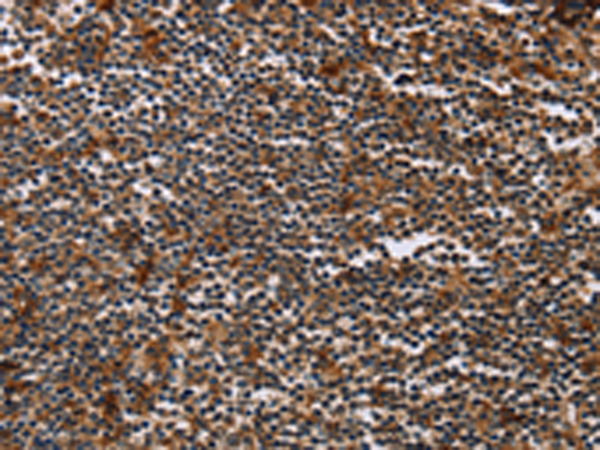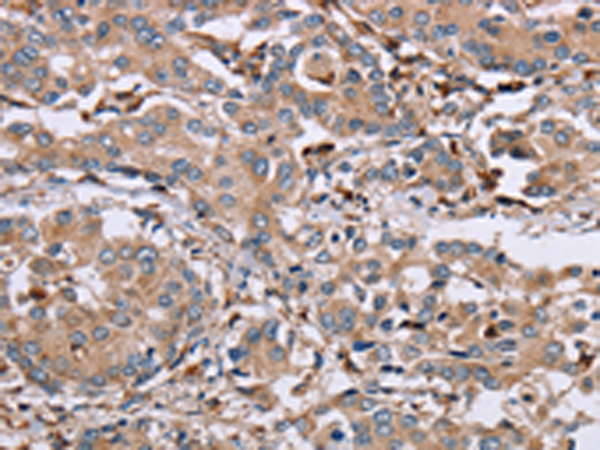


| WB | 咨询技术 | Human,Mouse,Rat |
| IF | 咨询技术 | Human,Mouse,Rat |
| IHC | 1/50-1/200 | Human,Mouse,Rat |
| ICC | 技术咨询 | Human,Mouse,Rat |
| FCM | 咨询技术 | Human,Mouse,Rat |
| Elisa | 1/2000-1/5000 | Human,Mouse,Rat |
| Aliases | HIP8; HYPD; CT1.3; MAGE3; MAGEA6 |
| WB Predicted band size | 35 kDa |
| Host/Isotype | Rabbit IgG |
| Antibody Type | Primary antibody |
| Storage | Store at 4°C short term. Aliquot and store at -20°C long term. Avoid freeze/thaw cycles. |
| Species Reactivity | Human |
| Immunogen | Synthetic peptide of human MAGEA3 |
| Formulation | Purified antibody in PBS with 0.05% sodium azide and 50% glycerol. |
+ +
以下是关于MAGEA3抗体的3篇参考文献及其摘要概括:
---
1. **文献名称**:*"MAGE-A3 is a frequent tumor antigen in metastatic colorectal cancer recognized by CD4+ T cells"*
**作者**:Atanackovic D. et al.
**摘要**:该研究探讨了MAGEA3在转移性结直肠癌患者中的免疫原性,发现患者体内存在针对MAGEA3的CD4+ T细胞及体液免疫反应,提示其作为肿瘤疫苗或免疫治疗靶点的潜力。
---
2. **文献名称**:*"Development of a human single-chain variable fragment antibody against MAGE-A3"*
**作者**:Tiwari R. et al.
**摘要**:研究团队开发了一种针对MAGEA3的人源化单链抗体(scFv),通过噬菌体展示技术筛选并验证其特异性结合能力,为靶向MAGEA3的肿瘤免疫治疗(如CAR-T或抗体药物偶联物)提供了工具。
---
3. **文献名称**:*"Antibody responses to cancer/testis antigens in melanoma patients: Association with clinical features and NY-ESO-1 expression"*
**作者**:Gure A.O. et al.
**摘要**:该研究分析了黑色素瘤患者对多种癌症睾丸抗原(包括MAGEA3)的抗体反应,发现MAGEA3抗体水平与肿瘤进展和NY-ESO-1表达相关,提示其作为预后标志物的可能性。
---
**补充说明**:MAGEA3作为癌症睾丸抗原,其抗体研究多集中于诊断标志物开发、免疫治疗靶点探索(如疫苗或工程化T细胞)以及患者预后评估。如需具体实验细节或更多文献,建议通过PubMed或SciHub检索关键词“MAGEA3 antibody”或“MAGEA3 immunotherapy”。
The MAGE-A3 antibody targets the melanoma-associated antigen A3 (MAGEA3), a member of the cancer-testis antigen (CTA) family. CTAs like MAGEA3 are normally expressed in immune-privileged germline tissues (e.g., testes, placenta) but are aberrantly reactivated in various cancers, including melanoma, lung, and head/neck carcinomas. This restricted expression pattern makes MAGEA3 a promising target for cancer immunotherapy and a potential biomarker for tumor detection.
MAGEA3 antibodies are widely used in research to study its role in oncogenesis, including promoting tumor cell proliferation, metastasis, and resistance to apoptosis. These antibodies enable detection of MAGEA3 protein via techniques like immunohistochemistry (IHC), Western blot, or flow cytometry, aiding in cancer diagnosis and prognosis. Clinically, MAGEA3 has been explored in vaccine-based therapies and adoptive T-cell therapies, though clinical trials have shown mixed results, possibly due to tumor heterogeneity and immune evasion mechanisms.
Despite challenges, MAGEA3 remains a focus due to its tumor-specificity and potential for minimizing off-target toxicity. Research continues to optimize antibody-based strategies, including CAR-T cells and bispecific antibodies, to enhance targeting efficacy. However, variability in MAGEA3 expression across patients and cancers underscores the need for companion diagnostics to identify suitable candidates for MAGEA3-directed therapies.
×